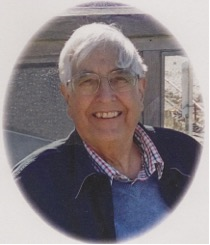Talented geophysicist and enthusiastic supporter of academic research, with an unswerving loyalty to colleagues and friends
 Dr. Dave McCann was born on 1st April 1938 and died of cancer on 8th July 2019 after a long illness.
Dr. Dave McCann was born on 1st April 1938 and died of cancer on 8th July 2019 after a long illness.
Dave followed an unusual career path, from an industrial apprenticeship at the age of 16 to research of international importance and high level management in the British Geological Survey. He left school in 1954 for an electrical engineering apprenticeship with the Bristol Aeroplane Company. Being a very slim youth, one of Dave’s tasks was crawling into the narrow tail of the Bristol Britania aircraft, then under construction in Filton, to install the tail-lights. Whilst he was an apprentice he attended college part-time and, among other technical qualifications, he achieved a B.Eng from the University of Bath. After taking a D.I.C. and an M.Sc. in Control Engineering at Imperial College, Dave became a Research Assistant in Marine Geophysics at the (then) University College of North Wales, Bangor, investigating the transmission of sound waves in sea floor sediments. During that work he devised original techniques for using ultrasound to scan unopened deep-sea cores laterally across, and longitudinally along, the core barrel, and for determining the velocity and attenuation of ultrasound with high precision in sediment samples. Dave successfully defended his PhD thesis in 1968.
He took up a post as a Senior Scientific Officer at the Institute of Geological Sciences (later known as the British Geological Survey) in South Kensington, London, working as a geophysicist in the Engineering Geology Unit (EGU) under Roger Cratchley. One of Dave’s first tasks was undertaking engineering geophysical surveys to support the geological mapping and geotechnical site investigations for the proposed Milton Keynes New Town. Among many other projects he and his team later undertook were seismic surveys ahead of the tunneling machine during the creation of the Channel Tunnel, ground investigations for potential nuclear repositories, geophysical surveys for pumped storage schemes in Scotland, an offshore seismic survey of Lyme Bay and laboratory determinations of geophysical/geotechnical relationships. From the beginning of his career, Dave was very enthusiastic to write up and publish the results of his work and consequently he has over 140 authored and co-authored publications in UK and international journals, a fitting record of his life’s work. Almost his last co-authored paper was published in 2013, by the Geological Society of London, in which the team explained how they used new and existing geophysical data to devise a new model for the original of the Hot Springs of Bath and Bristol. Dave was very proud of the Bath research and of the final paper.
Dave led the development of the EGU’s engineering geophysical research capability and was passionate about the development of new near-surface geophysical techniques to improve sub-surface site investigation. In particular, he carried out considerable research into the development of cross-hole seismic methods. This drive to develop the confidence of geotechnical engineers in the use of geophysics led to the holding of a major UK conference in September 1994. Dave was the Lead Editor for the Geological Society Engineering Geology Special Publication on ‘Modern Geophysics in Engineering Geology’, published in 1997, that followed the Conference. However, the task of integrating engineering geophysics into site investigation was not complete. Dave joined a joint Construction Industry Research and Information Association and Geological Society Working Party that resulted in a book on ‘Geophysics in Engineering Investigations’.
At the now British Geological Survey he became Manager of the Regional Geophysics Group in January 1985 and was promoted to Senior Principle Scientific Officer. In January 1991 Dave took charge of the Engineering Geology and Geophysics Group. Then, in July 1995 he transferred to take leadership of the Fluid Processes and Waste Management Group, which he managed until his retirement in April 1998.
Dave was a Fellow of the Geological Society, elected to be a Member of Council from 1985 to 1988. He was Secretary of the Engineering Group from 1976 to 1980 and Chairman of the Environmental and Industrial Geophysics Group from 1990 to 1994. Dave was a Member of the European Association of Geoscientists and Engineers and of The Society of Exploration Geophysics.
Dave was always enthusiastic to help and support academic research in universities. Through him, the BGS was generous in loaning expensive geophysical field equipment and laboratory equipment to university departments. Dave acted as External Examiner for undergraduate courses and undertook Ph.D. vivas. He contributed to the Reading University Geology Department both as a joint research Supervisor and as a member of PH.D. student Advisory Groups. As an example of the generous use of his time, one day on his commute to London he met a ‘time-expired’ geophysics Ph.D. student who was despairing about completing his thesis because an accident to his survey equipment had deprived him of most of his data. Dave encouraged and supported the student until he reached the point of successfully submitting a finished thesis. After he retired from the BGS, Dave was appointed as Honorary Professor of Geophysics in the University of Edinburgh, teaching ‘hands-on’ geophysical techniques with Peter Fenning to Civil Engineering students. The Head of Engineering commented that the students ‘loved the on-to-one attention from Dave and Pete.’
Dave was a fine man and a fine scientist – practical, hard-working, with an original mind and unswerving loyalty to colleagues and friends.
Dave is survived by his wife, Pat, of nearly 60 years, his three children (a fourth pre-deceased him) and five grandchildren. He and Pat were keen gardeners and devout Christian members of the Baptist Church of Kilmington, Axminster, Devon. He was a lifelong supporter of the football team, Bristol Rovers. In retirement Dave again took up his former hobby of philately, one of many subjects on which he was an expert.
By Clive McCann and Martin Culshaw with contributions from Michael Forde.